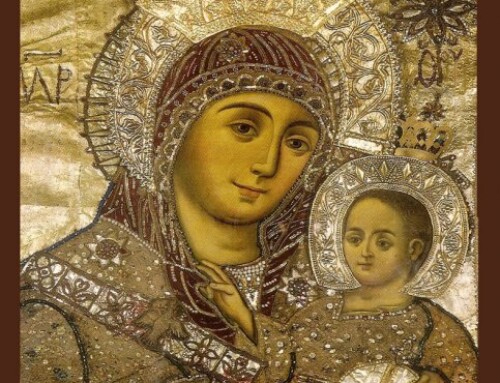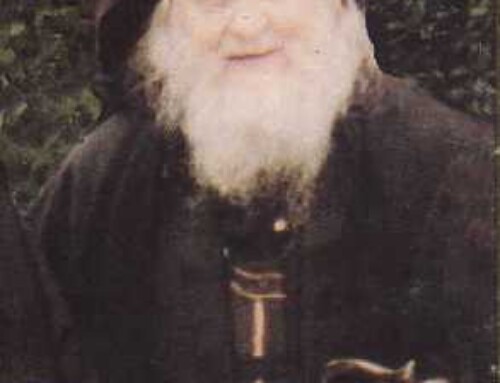Word Magazine January 1991 Page 23
FAITH IN EVERYDAY LIFE
by Father Stephen Adams
With the face of Christianity so constantly changing, it is hard to pinpoint what is to be believed by an Orthodox Christian. We hear of new movements around us; liberation theology, feminist theology, fundamentalist theology. We see Christian activists, moralists, charismatics. We encounter those who are traditional and those who are liberal. What is the foundation of our belief, where do we stand?
In the everyday experience of faith for an Orthodox Christian, Jesus Christ stands at the center of every action. Every act of faith, whether it be personal prayer or community worship, is an expression, in some form, of the saving acts of the Son of God. Thus, the Orthodox experience is first and foremost incarnational; it is that personal encounter with the God-Man Jesus, it is that faith and trust in Him. As St. Athanasius so beautifully put it, “God became man so that we might become like God.” Through Jesus Christ, we are raised to God the Father through the Holy Spirit. The Christian life is sharing in the life, love and truth of God Himself.
For the Orthodox believer the life of faith is strengthened and lived through reliance on three main sources: the Church’s worship, personal prayer and reading of Holy Scriptures. Each of these is a means of deepening the faith of every believer. The reliance on the sources is the foundation of the spiritual life; each is interdependent on the other and cannot be separated. But faith for an Orthodox Christian is not only spiritual and intellectual, but also strongly connected to history and culture.
ORTHODOX CULTURE
North American Orthodox Christians are second and third generation immigrants to North America coming from such regions as the Middle East, Eastern Europe, Russia, Asia Minor and the Balkans. These people are proud of their heritage and boast that Christianity originated in these countries. (In Acts 11:26 they were “First called Christians in Antioch”. St. Paul wrote many of his epistles to communities in Greece and Asia Minor). Orthodox Christians are proud of their ancient roots and their religious heritage which can be traced back to apostolic times and which is manifest in their everyday life.
For the Orthodox Christian culture is intimately interwoven with faith. In the typically Orthodox countries of the past, support was given by the society itself to uphold certain traditions and values. There was a whole culture with its customs and public observances which strengthened existing religious traditions. If we take for example the Lenten Season, the entire society accepted a rhythm of life which reminded each individual member of the great feast.
In Russia one could not forget Lent if only because of a special Lenten church bell which rang daily; in Greece most of the places of entertainment closed so that the faithful could attend the special church services. The society created an atmosphere which gave importance to religious traditions. Even the food and the song of the people related to this life of faith. The small customs and the climate of the people bound together ones personal beliefs with the totality of life. And so it remains to this day that the Orthodox Faith is not only intellectualized but taken into the home and daily life of the believers.
A more concrete way of understanding how the Church’s Faith is brought into the home and lived in its everyday life is seen through the different rites of blessing. These rites of blessing are a sanctification of every aspect of one’s daily life by the Church. During the season of Epiphany, commemorating Jesus’ baptism in the River Jordan, the priest blesses the home of each Orthodox Christian believer. There are also prayers and blessings for many other events in one’s daily life; from birth and marriages to anniversaries, beginning school, new purchases, houses and businesses. Culture and faith are inseparable and play a large part in the life experience of every Orthodox Christian.
ORTHODOX WORSHIP
Perhaps at the very heart of the Orthodox experience is its Liturgical expression. Liturgy has always been the very center of Orthodox Christian life, not only as a form of devotion or piety but also as an assembly of the People of God, gathered together in His name. For the Orthodox, the Church essentially is not so much the symbol of security of doctrinal guidance as it is an experience of communion with God, and this experience takes place, first of all, in worship and more specifically in the Sacrament of the Eucharist. The fullness of Christ’s presence in the Eucharistic Liturgy is the main sign of God’s faithfulness to his Church, the great miracle of new life appearing to man.
Orthodox worship proved to be an extremely powerful means of expressing the Christian Faith. For five hundred years, when the Orthodox Christians in the Middle East and the Balkans were deprived of schools, books and other means of education by oppression, it was the liturgical worship, performed in the language understood by all, which was able to provide the faithful with essential religious instruction. A comparable phenomenon took place in Russia and other eastern European communistic regions where government regulations forbid all religious activities aside from worship in church.
In places where the Church can continue to perform in its social and missionary tasks, the Liturgy is the criterion and the inspiration of every Orthodox Christian. If before I said that the every day life experience of an Orthodox Christian is incarnational, it is also just as importantly resurrectional. For the Orthodox, Easter or Pascha is the feast of feasts, and this is when the faithful share in the eternity of Christ’s resurrection, where we are made “Sons of God” by His destruction of death through His own death.
A MOVEMENT TOWARD THE FUTURE
Faith in the everyday life of an Orthodox Christian is wholly bound up with the single reality of Jesus Christ. The saving events of Jesus’ life permeate every aspect of existence for the Orthodox believer; from his worship, culture, customs to food and music. It is the encounter with the living God as witnessed in the authoritative tradition of the apostles. It is this living tradition, this steadfast faith which binds the believer in a personal experience of fellowship with Christ and his fellow man.
Despite the interrelationship of faith and culture, Orthodox Christianity is not a folk tradition of some specific ethnic group, neither is it an ancient relic “frozen” somewhere in the fourth century, but rather it is the dynamic force in the daily existence of each believer. The faith of Orthodox Christians is an attempt to bring the ancient wisdom of the Church into contact with the questions posed by contemporary philosophy, science and social movements. The radical cultural and spiritual transformation of recent times has created a wholly new situation. It is up to the Orthodox Christian not merely to ignore or to assimilate but rather to confront the challenges which face it, whether this be world hunger, oppression, discrimination or new theological trends.
Faith in the everyday life of an Orthodox Christian is a great responsibility. Our vastly changed cultural and intellectual experience leads us to place the Church in a new position as listener, discerner and teacher. We must participate in helping to create the future through an active involvement in living out our faith in its daily existence. Orthodox Christianity cannot merely be a repetition of the past or a nostalgia of our former glories but an effective transformer of the future. This can only come through a re-discovery of Christ and the timeless truths of the Church in communion with all of mankind.
Father Stephen Adams is the associate pastor at St. Nicholas Cathedral in Brooklyn. NY


